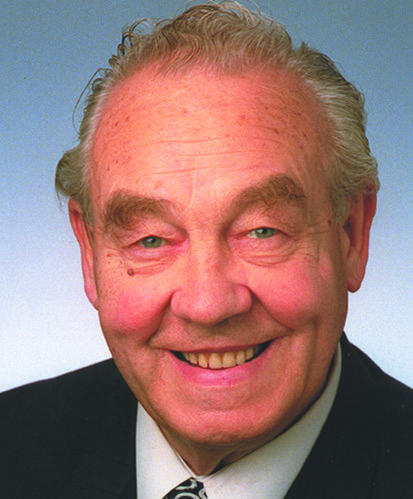Lord Thomas Edward ‘Ted’ Graham passed away on 21 March 2020, a week before his 95th birthday. A co-operative politician, author and campaigner, he was a strong supporter of co-operatives throughout his life – including Co-operative News, to which he contributed regularly, and read religiously. Here we remember a giant of the movement, whose commitment to co-operation spanned eight decades.
Ted Graham had co-operation at his core. Born in Newcastle in 1925, the son of a railway porter, he left school at 13 to work for the Newcastle-upon-Tyne Co-operative Society, delivering bread on a co-op bicycle.
He served in the Royal Marines from 1943, but was severely wounded in a training exercise in 1944, and returned to co-operative service in 1946. He was one of the first people to take part in the residential courses that the Co-operative College set up for people returning from WWII, hosted at Stanford Hall near Loughborough – and this sparked a life-long love of learning. He took numerous WEA evening classes and in 1976, aged 50, became the first MP to be awarded an Open University degree, which he studied for on the Underground and between votes in the Commons.

Ted was elected prime minister of the Tyneside Youth Parliament and was involved in the British Federation of Young Co-operators, before moving south in 1953 to be education secretary of the Enfield Highway Co-operative Society. In 1962 he was appointed southern secretary of the Co-operative Union, and in 1967 national secretary of the Co-operative Party. He was leader of Enfield council, and was the Labour and Co-operative MP for Edmonton from February 1974; he lost his seat in 1983 but was created a life peer, as Baron Graham of Edmonton, as Neil Kinnock sought to fortify an elderly front bench in the Upper House.
Related: Tributes to Lord Graham from the co-op movement
He was a senior government whip in the Commons under James Callaghan – and Labour chief whip in the House of Lords from 1990-97. Ted served as President of the 1987 UK Co-operative Congress, where he warned that Britain’s retail co-operatives were falling behind because they had to operate under legislation conceived a century before.
He believed that the co-operative movement “is based on men and women with the right principles at heart. It is full of splendid history and stories of progress.” Ted embodied this utterly.
He was an avid letter writer to the end, and became great friends with constituents, colleagues and fellow co-operators. While at the Co-op Party, Ted forged a close relationship with the shopworkers’ union Usdaw, which represented many employees of different co-ops. In the 70s, he became the driving force in the unlikely alliance of churchmen, shopworkers, the Co-op and the supermarket chain Sainsbury’s that resisted the legalisation of Sunday trading. The “Keep Sunday Special” campaign was finally defeated in 1994, but only after he won employees a statutory right to refuse to work on Sundays.
In the Lords, he led an unsuccessful move in 1986 – supported by Lord Denning – to abolish the death penalty for members of the armed forces, and in December that year he was the only peer to speak in the Lords against Lord Halsbury’s Local Government Act 1986 (Amendment) Bill – the notorious section 28, which sought to prohibit the promotion of homosexuality by local authorities. “What I am arguing is that there is a great danger, if this amending Bill is passed, that it will seek to repress the honest and open discussion of these matters at a time when, in my view, they ought as never before to be discussed seriously and sensibly in our schools,” he said. “I believe that this is not a helpful Bill. I believe it does not promote what we ought to have at the moment, which is a greater understanding of the sexual orientation of everyone in our society. I believe it would have the effect of repressing discussion in schools and hampering the development of organisations designed to assist.”
In 1991, he told peers that if Westminster was the “Mother of Parliaments”, more must be done for mothers in Parliament – despite the Lords themselves having little use for a crèche.
He was also a competitive member of the parliamentary swimming team, and on leaving Tyneside became a devoted Millwall supporter. Ted married Margaret Golding in 1950; she died in 2005, and he was also predeceased by their two sons, Martin and Ian, which devastated him.
Despite ill health in his final years, he would regularly write to and phone the Co-op News office from his care home in Knebworth. In his final interview with us in 2018, he worried for the future of co-operatives.
“[Their] future is full of danger, many of them of our own making,” he said, concerned about mergers, democracy and the decline in active, passionate membership. “In the 1940s, gatherings for the Newcastle Society in the City Hall, which held over 1,000, was often overflowing. A dividend announcement or a fiercely fought local issue could draw vast attendance. There was an air of excitement – the reduction in the dividend declared could create a riot! Where are these members now?”
For co-ops, “the winning ingredient isn’t necessarily scale – it rests substantially more on the quality of management,” he said. “Although we cannot match the access to hard capital of our main competitors, all is not lost. The success of co-operatives over the last century tells us that the co-operative values and principles can be at least one secret to winning.”